Heroes of the liberation of Rostov
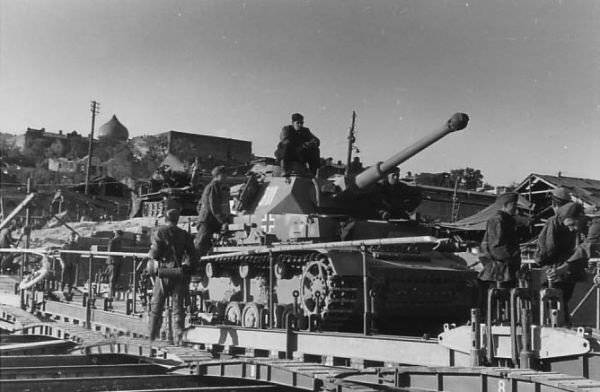
German troops on the streets of Rostov-on-Don, 1942 year
For many Rostovites, these months have become a real hell. 53 thousands of Rostovites were driven into slavery in Germany. About forty thousand residents of Rostov-on-Don did not manage to meet the liberators - they died at the hands of the invaders. In the Zmievskiy gully, the Nazis destroyed at least 27 thousands of Rostovites - communists, Komsomol members, people of Jewish nationality, captured Soviet military personnel. The UNKVD report on the Rostov region No. 7 / 17 from 16.03.1943 reported: “The wild outrage and atrocities of the occupants of the first days were replaced by the organized physical destruction of the entire Jewish population, the Communists, the Soviet activists and Soviet patriots. In the 14 city prison in February 1943 alone - on the day of the liberation of Rostov - 1154 corpses of the citizens of the city, who were shot and tortured by the Nazis, were found by Red Army units. Of the total number of corpses, 370 was found in a pit, 303 - in different parts of the yard, and 346 - among the ruins of a blown up building. Among the victims are 55 minors, 122 women ”(quoted in: Occupation of Rostov // http://smolbattle.ru/threads/Okkupatsiya-Rostova-na-Donu.31213/). The long-awaited re-release of Rostov-on-Don 14 in February 1943 of the year was the first victory of the Soviet soldiers for knocking out the Nazis from a city of this level.
At that time, while the Nazis were hosting in Rostov-on-Don, active work by the Soviet partisan underground began in the occupied city and its environs. Soviet patriots acted in extremely difficult conditions for underground work. First, Rostov-on-Don, as a major city, was flooded with German and allied troops. Secondly, among the townspeople, unfortunately, there was also a sufficient number of traitors who collaborated with the Nazis. Some of them motivated their cooperation with the occupiers with political considerations, hiding behind anti-communist slogans and discourses on the restoration of the pre-revolutionary order. Finally, the city was surrounded by treeless steppes, where it was almost impossible to equip full-fledged partisan bases, similar to those that existed in the Crimea or Belarus.
However, unnoticed by the Nazis, underground work was carried out on the territory of Rostov-on-Don itself. In the inconspicuous apartments, private houses, outbuildings, at city enterprises gathered circles of underground workers, preparing sabotage against the occupying forces. Among the underground workers were hiding party and Komsomol activists, soldiers and officers of the Red Army who broke through from their entourage, ordinary citizens - patriots of their country, and absolutely still young inhabitants of Rostov. The contribution of these people to the liberation of Rostov-on-Don is enormous and priceless. Therefore, none of the good words in memory of them will never be redundant.
Partisan named Alpha
When the Great Patriotic War began, the Alpha Shirazi Rostovites were only sixteen years old. It's time to fall in love, make plans for the future, choose a profession. Of course, only a good future was seen ahead of the young Alpha, which her classmates and neighbors preferred to call the more common name Allah.
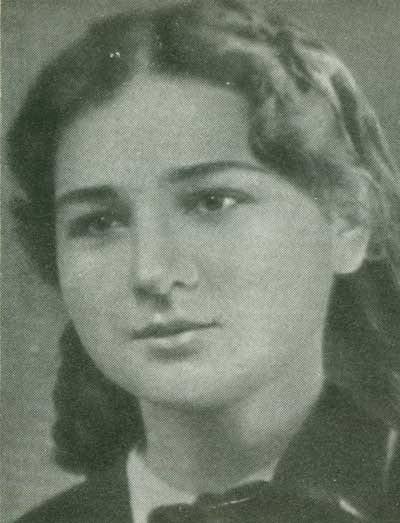 A Rostov woman with an unusual surname, name and patronymic - Shirazi Alfa Alievna - was the daughter of Iranian Ali Shirazi. Alpha did not remember him - he died when she was still very young. And the girl’s mother was called Dora Mikhailovna - it is clear that the woman was expected to have the fate of thousands of other Rostovites of Jewish nationality who were killed by the Nazis in Zmievskiy gully. If not for an excellent knowledge of the Persian language. When the Nazis arrived at Dora Mikhailovna and Alla’s apartment, the mother answered questions only in Farsi, and Alla translated. So they managed to convince the German officer that Dora Mikhailovna was a Persian by birth.
A Rostov woman with an unusual surname, name and patronymic - Shirazi Alfa Alievna - was the daughter of Iranian Ali Shirazi. Alpha did not remember him - he died when she was still very young. And the girl’s mother was called Dora Mikhailovna - it is clear that the woman was expected to have the fate of thousands of other Rostovites of Jewish nationality who were killed by the Nazis in Zmievskiy gully. If not for an excellent knowledge of the Persian language. When the Nazis arrived at Dora Mikhailovna and Alla’s apartment, the mother answered questions only in Farsi, and Alla translated. So they managed to convince the German officer that Dora Mikhailovna was a Persian by birth. Before the German invasion of Rostov-on-Don, Alpha Shirazi was an ordinary schoolgirl. She lived with her mother in the very center of Rostov - in a three-story house on the street. Defense, 74. A small street defense has survived to the present. It is located in the area of the famous Central Market, more precisely - just below, to the Don. Alpha studied at the 35 school and, like most Soviet children and teenagers, was a pioneer and then a Komsomol member. When Hitler's troops occupied Rostov, the girl contacted the underground workers. Nothing could threaten her, and so — she could easily sit out the occupation as thousands of her contemporaries. But Alpha wanted to act, to make its own contribution to bringing victory over the invaders. On the instructions of the underground organization, Alpha infiltrated the headquarters of the Nazis. It turned out to be easier than she supposed - firstly, a good knowledge of German, which she mastered at school, played a role, and secondly, her late father's Iranian citizenship, indicated in the Alpha metric, also helped build confidence in the Germans. The Nazis believed that the representatives of the Muslim peoples of the East were never loyal to the Soviet authorities. Alpha was taken to the headquarters translator, but, of course, at first she was carefully watched.
I must say that Alpha was not the only Soviet underground worker in the headquarters. Many citizens employed in the institutions of the occupation authorities and the German headquarters, even without being associated with the underground, could, with their own patriotic motives, sabotage the work of the Nazi structures and wherever they could harm the invaders. So, the girl - Alpha's colleague at work in the headquarters - stole very important documents - lists of the residents of Rostov-on-Don, who were supposed to be arrested by the Gestapo. These were communists, underground workers, as well as persons suspected of sympathizing with the communists. The girl was immediately suspected of stealing documents by German officers, but Alpha managed to warn her and, taking lists from her, destroy them in the toilet.
While Alpha was working at the headquarters of the Nazis, she put herself in mortal danger every day. Indeed, in case of clarification of her true intentions, she would inevitably be shot. Especially given the fact that the mother of Alpha, Dora Mikhailovna, was Jewish. Nevertheless, the girl managed to work for several months at the German headquarters, bringing a lot of benefit to the underground workers operating in the city. When in February 1943 began the assault of Rostov-on-Don by Soviet troops and the Nazis began to gather to retreat, the Alpha authorities from the headquarters offered her, along with the mother, who the Germans considered Iranian, to retreat with them - the policemen and employees occupying institutions. However, the plans of Alpha did not include further stay with the Nazis - the girl wanted to fight against them in a reconnaissance or partisan detachment.
Rostov-Alpha, freed from the Nazis, graduated from the courses of radio operators-operators and carried out the assignments of the district Komsomol committee. Before being enrolled in a special unit heading to the rear of the enemy, Alpha gave the appropriate subscription: “Strictly secret! Subscription. It is given by me, Shirazi Alfa Alievna, to the headquarters of the partisan movement of the Stalingrad Front, in that I voluntarily agree to head to the rear of the enemy on the temporarily occupied territory of the USSR for military intelligence and ruthless struggle against the Germans. I undertake to undertake my cooperation with the partisan detachment and undertake in the strictest secrecy and under no circumstances disclose to anyone. If I violate my obligations and thereby change my motherland, I will be responsible as a traitor to the motherland under martial law. All work will be carried out under the pseudonym "Alexander Dubrovskaya." 10 of April 1943 of A. Shirazi ”(V. Vovenko In the open field near Pavlovka // http://old.donbass.ua/get-news/id/1543/article.html). To fight against the Nazis, the alpha was to be in the detachment of the famous Yugov.
Yugovtsy
In fact, Yugov was called Mikhail Mikhailovich Trifonov, and if more precisely, Mina Minievich Trifanidi. By nationality he was Azov Greek - a native of the village of Constantinople of the Azov province. By the time of the occupation of Rostov-on-Don by Hitler's troops in July 1942, Trifonov was 28 years old. He was born on December 10 1913 of the year, brought up from the year 1921 in the orphanage, and then - the working school of Tomsk University. However, the fate of the young man after graduating from the workers' school turned out to be connected with the military service. He graduated from the Kharkov border school of the NKVD and was sent to serve in the border troops in the Far East.
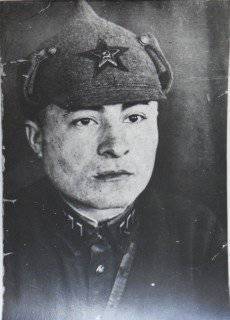 Then he was demobilized due to rheumatism. However, despite his sore feet, with the beginning of the war he joined the army again. In October, 1941 Lieutenant Trifonov, who by this time served in the 45 th reserve rifle regiment as platoon commander, was placed at the disposal of the intelligence section of the Southern Front headquarters. The command found a former border guard with a university education, and even a Greek by nationality, a suitable candidate for military intelligence service.
Then he was demobilized due to rheumatism. However, despite his sore feet, with the beginning of the war he joined the army again. In October, 1941 Lieutenant Trifonov, who by this time served in the 45 th reserve rifle regiment as platoon commander, was placed at the disposal of the intelligence section of the Southern Front headquarters. The command found a former border guard with a university education, and even a Greek by nationality, a suitable candidate for military intelligence service. One of the main problems facing the leadership of Soviet military intelligence at that time was the lack of residencies in “internal” cities such as Rostov-on-Don. If in the west of the country, closer to the state border, military intelligence left the residents, then the command was not ready for the capture of Rostov by the Nazis, so after the retreat of the troops from the city, there were no Soviet military intelligence officers left. I had to create a residency from scratch. For this purpose, Michael Trifonov was well suited - a man quite experienced and prepared, familiar with the terrain. 16 October 1942 Trifonov, using the pseudonym "Yugov", arrived in the German-occupied Rostov to create an underground organization here. So began story Partisan detachment them. Stalin, after the liberation of Rostov transformed into an intelligence unit.
By the time Trifonov-Yugov arrived in Rostov, a small partisan group Tramvayschik was already operating here. From 9 September 1942, the group printed and distributed among the population of the city leaflets calling not to panic and not to cooperate with the occupation authorities. Trifonov, who now became Yugov, began to form his own partisan detachment. His tasks included the collection of intelligence data, propaganda work among the population and Soviet prisoners of war, the distribution of leaflets. Several local residents and fighters of the Soviet units joined Yugov, who, after the defeat of their units, managed to get back to the Germans.
So, Sergey Kukuyuk, who served as a private in the 63 regiment of the 45 rifle brigade, managed to break out of the encirclement and get into his native Rostov. Here he accidentally met on Trifonov Street - Yugov, whom he had known since recruiting - they were both called through the Rostov military enlistment office and also became a fighter and then chief of staff of a partisan detachment. Kukuyuk led his brothers to the detachment, who could not escape with the Soviet troops, and they were also located in Rostov-on-Don. To disguise, Cucuyuk joined the police force - the position of the policeman gave him not only the ability to gather intelligence information, but also an excellent cover for moving around the city. The headquarters of the underground detachment was also located in the house of Kukuyuk - this was the best solution, since the police officer did not arouse suspicion among the local population of the Nazis.
The core of the Yugov detachment was formed. These were: Mikhail Trifonov (Yugov) - commander, V.P. Thanks - Commissioner, S.E. Kukuyuk - Chief of Staff, V.E. Kukuyuk (Orel) - the commander of the shock group, D.P. Lomov is a doctor. The underground workers managed to establish contact with several military personnel of the allied forces of the enemy. In addition to the top men, units of the armies of the countries - allies of Germany, including Slovakia, were also stationed in Rostov. Not all of the servicemen of these units liked the participation in an aggressive war against the Soviet Union, especially since there were people of anti-fascist and even communist convictions among the mobilized officers and soldiers. Lieutenant of the Slovak Army Jan Gatzdoschik and two more Slovaks - Joseph Tokach and Richard Kanja - began to cooperate with the Soviet partisans and carry out their orders.
The number of detachment Yugov reached 122 people. The detachment was divided into groups responsible for the printing of leaflets, their distribution, and agitational work among Soviet prisoners of war and military personnel of the enemy’s armies, for collecting intelligence data. A group of typists of the detachment consisting of Alevtina Serdyuk, Vera Krajeva and Antonina Savelieva printed leaflets with appeals and materials from the Soviet Information Bureau. A total of 4000 flyers were printed. Doctors D.P. Lomov and B.N. Chusarev, continuing to work in medical institutions in Rostov, not only provided assistance to the underground workers, but also managed to save more than five hundred residents of Rostov-on-Don from being sent to Germany to slavery to the Nazis. The guerrillas were engaged in organizing transfers to prison and prisoners of war.
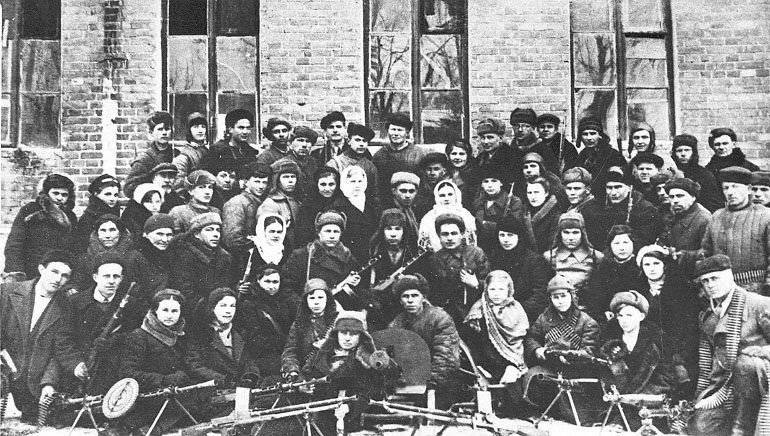
In the battles for the liberation of Rostov
He began a detachment and sabotage operations against the occupying forces. Commander of the sabotage group, Vladimir Kukuyuk, brother of the Chief of Staff of the detachment Sergey Kukuyuk, commanded, and one more brother, Yakov Kukuyuk, and Fyodor Sukhorukov, Nestor Nikolaev, Konstantin Shimarin and Anatoly Yermakov were in the group. Among the good deeds of these partisans is an attack on a convoy of Wehrmacht with ammunition in the territory of the Northern village of Rostov. The saboteurs managed to destroy the convoy guards and blow up three ammunition vehicles. Another combat outing is the destruction of five Nazi patrols, accompanied by the removal of trophy weapons in favor of the partisan detachment.
By January, the 1943 was destroyed by more than 200 Nazi soldiers and officers by the Rostov underground workers. The underground workers inflicted great damage on the material and technical base of the Wehrmacht - they destroyed the 24 of the car, the mortar, the artillery gun, burned 24 tons of fuel. The arsenal of the partisan detachment was also replenished by attacks on German and allied forces — the underground fighters were able to seize two machine guns, hundreds of rifles and machine guns, and 25 with thousands of rounds. The water treatment filter of the brewery was blown up, the electric motor was burned, with which water was supplied to the location of the German units. Yugov’s detachment was never exposed and defeated by Hitler’s counterintelligence. And this is despite the scale of its activities. Of course, unfortunately, it did not do without losses. Thus, Mikhail Shcherbakov, a resident of Taganrog, who was involved in the activities of the detachment with his son Vladimir and his daughter Olga, was captured by the Gestapo men. He was captured in January 1943.
Before the liberation of Rostov by the Soviet troops, the Nazis were going to blow up the most important urban infrastructure, including several buildings of the Rostselmash plant, a giant of agricultural engineering, as well as a bakery and a paper mill. It was the partisans of Yugov who managed to save these objects from inevitable destruction. At the Rostov bakery, functioning up to the present, in some places there are still visible traces of bullets seventy years ago.
When the Soviet troops approached Rostov and the fighting for the city began, Yugov and his men entered into open confrontation with the Nazis. The detachment, whose fighters were mainly located in private houses on the territory of the eastern outskirts of the city - in Berberovka (Mayakovsky village), on Selmash and in Ordzhonikidze village, was divided into three groups and began the destruction of the Nazis on the territory of Selmash and Mayakovsky villages. On the night of February 14, 1943, partisans attacked the Nazis, who were entrenched in the West Division. For six hours there was a battle between Soviet patriots and Hitler’s military unit. He ended up with a victory for the partisans over the regular part of the wizards. 93 German soldiers and officers were killed, ammunition depots and three mortars were destroyed.
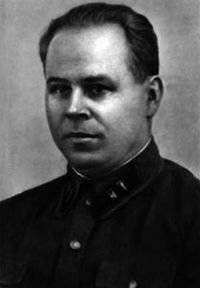 By the time the war began, Vasily Dmitrievich Avdeev was already over forty. Unlike most other partisans, he was a true personnel officer of the special services, with a wealth of life experience. Vasily Dmitrievich was born back in 1898 and managed to serve as a medical assistant in the tsarist, and then in the Red Army. After the Civil War, he served in the county police, the Simbirsk provincial Cheka, then in the Plenipotentiary Representation of the OGPU of the USSR in Central Asia. From 1934 to 1936 Avdeev was an assistant to the head of the secret political department, and in 1936-1938. - Head of the secret political department of the OGPU. In the years 1938-1939. Avdeev, who by that time had received the rank of major of state security (this was a high rank corresponding to the army brigade commander or naval captain 1st rank), headed the agricultural department of the UNKVD in the Tambov region. But in January 1939, Vasily Avdeev, as often happened in those years, was illegally repressed. He was arrested in a trumped-up case and kept in custody until 1941. On July 15, 1941, Avdeev was sentenced to death for participation in the Trotskyist organization, but on February 18, 1942, the Supreme Court of the USSR granted his request for sending him to the front. And after the war he had to sit out a ten-year term. Naturally, Avdeev went to serve as a medical assistant - according to the old military specialty. He fought near Kerch and Rostov-on-Don, then was captured.
By the time the war began, Vasily Dmitrievich Avdeev was already over forty. Unlike most other partisans, he was a true personnel officer of the special services, with a wealth of life experience. Vasily Dmitrievich was born back in 1898 and managed to serve as a medical assistant in the tsarist, and then in the Red Army. After the Civil War, he served in the county police, the Simbirsk provincial Cheka, then in the Plenipotentiary Representation of the OGPU of the USSR in Central Asia. From 1934 to 1936 Avdeev was an assistant to the head of the secret political department, and in 1936-1938. - Head of the secret political department of the OGPU. In the years 1938-1939. Avdeev, who by that time had received the rank of major of state security (this was a high rank corresponding to the army brigade commander or naval captain 1st rank), headed the agricultural department of the UNKVD in the Tambov region. But in January 1939, Vasily Avdeev, as often happened in those years, was illegally repressed. He was arrested in a trumped-up case and kept in custody until 1941. On July 15, 1941, Avdeev was sentenced to death for participation in the Trotskyist organization, but on February 18, 1942, the Supreme Court of the USSR granted his request for sending him to the front. And after the war he had to sit out a ten-year term. Naturally, Avdeev went to serve as a medical assistant - according to the old military specialty. He fought near Kerch and Rostov-on-Don, then was captured. In 1942, Vasily Dmitrievich was in Rostov-on-Don, in a prisoner of war camp, and here he was able to develop serious underground activities. He managed to prepare and lead the escape of 800 prisoners of war. After escaping from the camp, Avdeev joined Yugov’s detachment and during the liberation of Rostov-on-Don by Soviet troops, led by partisans attacked a prisoner of war camp and, after destroying Hitler’s guards, freed the Soviet soldiers and officers contained there. Later, Avdeev commanded a partisan detachment in the Donbas and in the Odessa region, but in March 1944 was surrounded by the Nazis. Not wanting to be captured, Avdeev shot himself in the head, but he survived. When he regained consciousness in a German hospital and found Hitler’s counterintelligence officer preparing for interrogation at the bed, he committed suicide by hitting his head on the iron corner of the bed.
Among the Soviet people who fearlessly fought with the enemy in the ranks of the Rostov underground, there were very young guys, practically children. Thus, 13-year-old Tolya Podushko and 12-year-old Savva Lotoshnikov served in the detachment. Anatoly Vasilyevich Podushko was then only 13 years old and his name was simply Tolik. Father Tolik, the Germans shot and killed in the first days of the occupation - they gathered all the men of the First Ordzhonikidze village, where the once happy Pushko family lived, and shot. A month later, his mother died of grief. This is not forgiven - and Tolik, left without a parent, was in the squad of underground fighters. He was sheltered by an aunt who introduced the boy to the commander of the partisan detachment Trifonov-Yugov. However, most likely, he would have become a partisan and in any other case - the youth of those years did not see any other way for themselves except to fight the invader before the last.
“If we talk about the patriotism of the youth of those years, then I myself am a witness: he was at the highest level,” recalls Anatoly Vasilyevich Podushko, “I will cite this fact. In 1943, we, the young guys, were offered to go behind enemy lines to organize a partisan detachment. No one had any doubts, everyone was ready. Chose the 14 man, I was the 14. And how can this happen! Before shipping, I fell into a hole full of ice water. I was sent to the hospital, it turned out that I have severe lobar pneumonia. So it turned out that I did not get into the group of paratroopers from 13 a man who was led by the commander of the Rostov partisan detachment named after Stalin, Mikhail Trifonov (better known as Yugov). There were several girls among them, not just guys. And severe inflammation, which almost ruined me and sent me to the grave, in the end, it turns out, saved my life ”(quoted in: Smyslenko O. Tolik - partisans // Rostov Official, No. 28 (1023), July 9 2014) .
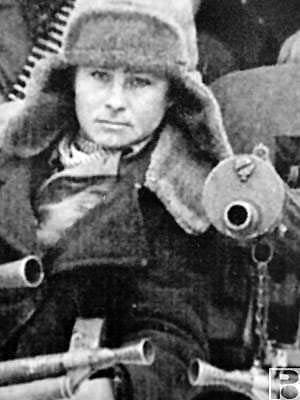 Tolik Podushko also participated in the legendary “Avdeevsky” liberation of Soviet prisoners of war: “Our group moved towards the Dachnoye settlement. There was a prisoner of war camp, and we suspected that they would simply be destroyed as soon as it became clear that the Nazis could not keep Rostov. Approach closer hampered the enemy machine gun. I managed to get close to the machine gunner and flash it with an automatic burst. We, boys, were good at shooting then, you learn quickly in war. The machine gun is dead. The guards of the camp were crushed, ours were freed ”(quoted in: Smyslenko O. Tolik - partisans // Rostov Official, No. 28 (1023), 9 July 2014).
Tolik Podushko also participated in the legendary “Avdeevsky” liberation of Soviet prisoners of war: “Our group moved towards the Dachnoye settlement. There was a prisoner of war camp, and we suspected that they would simply be destroyed as soon as it became clear that the Nazis could not keep Rostov. Approach closer hampered the enemy machine gun. I managed to get close to the machine gunner and flash it with an automatic burst. We, boys, were good at shooting then, you learn quickly in war. The machine gun is dead. The guards of the camp were crushed, ours were freed ”(quoted in: Smyslenko O. Tolik - partisans // Rostov Official, No. 28 (1023), 9 July 2014). After the liberation of Rostov-on-Don, it was decided to form from Yugovtsev a special reconnaissance and sabotage group that could act in the enemy's rear - in the Donbas. The Soviet command took into account the fact that, in the first place, the people of Yugovtsy already had extensive experience in deploying partisan activities in Rostov-on-Don, and secondly, Trifonov-Yugov himself was a native of those places and knew Yenakiyevo, Amvrosievka and other settlements Donbass. At special courses organized by the headquarters of the guerrilla movement of the Southern Front, people from Yugovtsy underwent three-month training.
The last battle of thirteen heroes
On the night of 30 on 31 in May, 1943 from the airfield of Rostov-on-Don in the direction of Donbass two aircraft flew. In each of them were fighters of the partisan detachment of the Southern Front. The first plane flew 13 partisans led by Trifonov-Yugov, the second - 8 partisans and 2 scout headquarters of the partisan movement led by Vasily Avdeev. The tasks of the partisans included landing in the area of the village of Novokarakub (Krasnaya Polyana), since there were no German troops in the 20 radius. However, the aircraft dropped the paratroopers 50 km away from the forest due to the deviation from the course. Vasily Avdeev’s group landed in the Bolshaya Yanisol area (Velikaya Novoselka), but almost immediately was surrounded by German troops and officers from 350. For seven hours, ten people from Avdeev’s squad fought 350 against the Nazis and were able to break out of the encirclement. In the battle, only one Soviet partisan was killed, but the Nazi soldiers managed to put at least eighty at least.
The detachment under the command of Trifonov-Yugov was less fortunate. The composition of his landing group included 13 people. These were, besides Trifonov himself, the detachment’s commissar and participant in the Civil War, Semyon Melnikov, Junior Lieutenant Sergei Merzlyakov, radio operator Nikolay Kiselev, and reconnaissance fighters: five guys - Alexei Zhurov, Semen Liznev, Victor Smetannikov, Konstantin Tarantsov, Vladimir Shcherbakov, and four girls - Lydia Akimova, Nina Vashchinkina, Nina Neygof and Alpha Shirazi. Yugovtsy landed near Pavlovka, near the modern city of Ugledar.
However, the Nazis managed to almost immediately detect the Soviet paratroopers. It happened like this. Money changers were walking along the road near Pavlovka - a man and three women engaged in exchanging clothes and shoes for food. One of the women discovered a parachute sprinkled with earth in 40 meters from the road and pulled it out. However, her companion parachute from a woman was taken away and put on the bottom of his car. But near the bridge, a group of money changers was discovered by a police patrol. Seeing the parachute, the Nazis immediately went in search of landing Soviet intelligence officers. A German division of five hundred soldiers and officers, armed with machine guns and mortars, was abandoned in search of Soviet soldiers. In addition, the Hitlerite command transferred two hundred policemen from nearby villages.
Thirteen yugovtsev decided to give the final battle to the superior forces of the enemy. The battle between thirteen partisans and several hundred soldiers, officers and policemen lasted about seven hours. The plantation, where the Yugovtsy defended themselves, was incessantly bombarded with machine guns and mortars of the Hitlerite unit. However, during the battle, partisans succeeded in destroying more than 100 of the Nazis and injuring about 150 of Wehrmacht and policemen. While the battle was on, Yugov decided to send one of his fighters, Vladimir Shcherbakov, to the road to leave the territory of the operation and, surviving, to report to the headquarters of the partisan movement that Yugov’s squad had fallen heroically in a battle with the Nazis. But Shcherbakov was issued by local residents. The hero-partisan was beaten to death in Nazi dungeons. So the hero-son shared the fate of his hero-father Mikhail Shcherbakov, five months earlier killed in the dungeons of the Rostov Gestapo. The radio operator Nikolai Kuznetsov blew himself up and the walkie-talkie with a grenade. Killed and the rest of the squad. The last to die were the seriously wounded Lydia Akimova and the detachment commander Mikhail Trifonov-Yugov. They were not lucky enough to meet the Great Victory alive — two years remained until the final destruction of Hitler Germany.
The dead Soviet soldiers were awarded posthumously the Orders of the Patriotic War of the 2 degree. However, none of the heroes of the Yugovtsev was honored with the high title of Hero of the Soviet Union. Although, undoubtedly, their seven-hour battle with the Nazis in Pavlovka is one of the most striking examples of the heroism of the Soviet soldiers during the Great Patriotic War. Victor Vovenko, the author of a good article about the Yugovtsev feat, believes that two factors were the cause. The error of the pilots Chernyakov and Guliaev, who deviated from the course, led to the fact that the scouts were thrown out not where they were supposed to be originally, but in an uncomfortable area for masking. Accordingly, the disclosure of details about the heroism of the Yugovtsy, after assigning them the titles of Heroes of the Soviet Union, would inevitably lead to an autopsy of the fact of pilot error, and hence their command. In addition, the very details of the discovery of Soviet scouts by the Nazis created a reason for doubts about the professionalism of Soviet soldiers (V. Vovenko, in the open field near Pavlovka // http://old.donbass.ua/get-news/id/1543/article.html) . However, not only professionalism, but also heroism, the people of Yugov proved with a vengeance - a seven-hour battle and at the cost of their lives. Therefore, in our time, it is high time to restore historical justice and assign a high rank to all of Yugov posthumously.
After the war, on the site of the last battle of Yugov’s detachment, near the village of Pavlovka, an obelisk was installed in memory of thirteen heroic Soviet soldiers who died here. And the field on which the unequal battle of the Soviet patriots and the Nazis took place, has since been called Partizan. In Ugledar, two central streets are named after Mikhail Trifonov and Thirteen paratroopers. In the Rostov secondary school number 35 there is a museum of its legendary student Alpha Shirazi - a remarkable Rostov woman of Persian origin, who fell in the fight against the occupiers. Name Yugov named a small alley in Rostov-on-Don. It is located in the Western village, on the territory of the Zheleznodorozhny district of the city. There is in Rostov-on-Don, in Pervomaisky district, and the street named after Mikhail Shcherbakov. Unfortunately, there is no street or alley named after Alpha Shirazi in the city, and it would not hurt to assign its name to some street or alley. After all, love for one's Motherland will never cease to be relevant, which means that respect for those who have fallen in the name of protecting its sovereignty will not disappear. More than seventy years have passed, and war has come again to the land of Donbass. The grandchildren and great-grandchildren of those who in the harsh years of the Great Patriotic War fought heroically against the Nazi occupiers, today defend the Donbass from the ideological heirs of the Hitlerite plague.
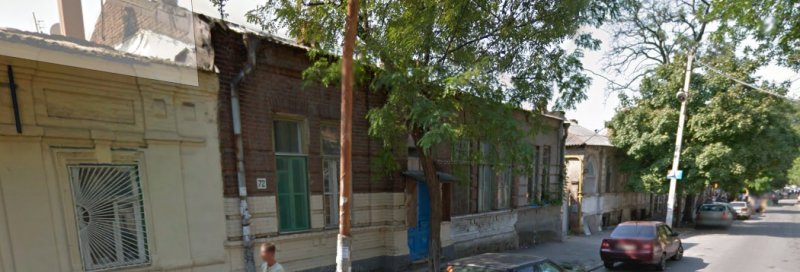
Information